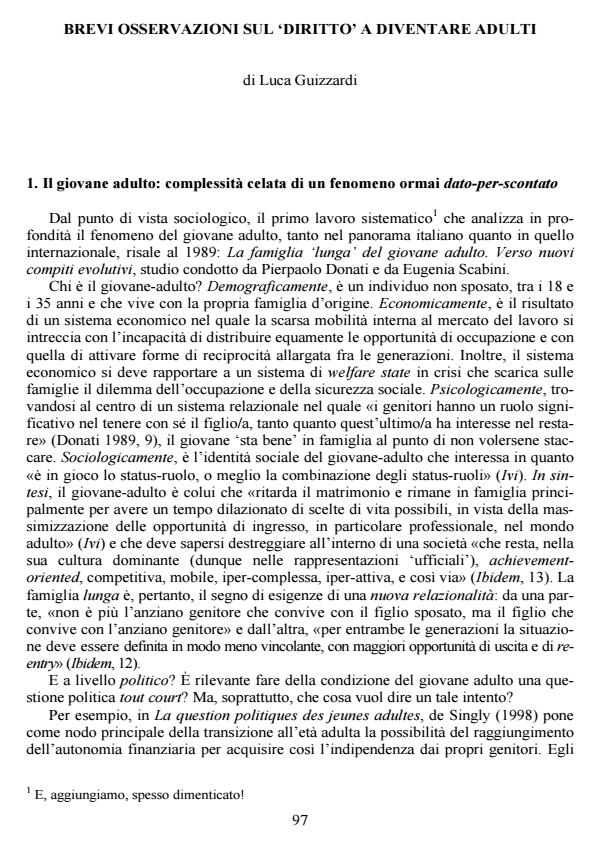Brevi osservazioni sul "diritto" a diventare adulti
Titolo Rivista SOCIOLOGIA E POLITICHE SOCIALI
Autori/Curatori Luca Guizzardi
Anno di pubblicazione 2007 Fascicolo 2007/2
Lingua Italiano Numero pagine 17 P. 97-113 Dimensione file 103 KB
DOI
Il DOI è il codice a barre della proprietà intellettuale: per saperne di più
clicca qui
Qui sotto puoi vedere in anteprima la prima pagina di questo articolo.
Se questo articolo ti interessa, lo puoi acquistare (e scaricare in formato pdf) seguendo le facili indicazioni per acquistare il download credit. Acquista Download Credits per scaricare questo Articolo in formato PDF

FrancoAngeli è membro della Publishers International Linking Association, Inc (PILA), associazione indipendente e non profit per facilitare (attraverso i servizi tecnologici implementati da CrossRef.org) l’accesso degli studiosi ai contenuti digitali nelle pubblicazioni professionali e scientifiche.
Some remarks on the right to become adult ABSTRACT: The transition to adulthood is more and more discussed from a political point of view as citizenship matter. For many scholars, it means that the State should support young boys and girls to achieve autonomy and independence. The youth has to achieve its full citizenship accomplishing its rights, exercising its duties, obtaining full access to the public and civil institutions, sharing community belonging with the others. The European Union, too, thinks that the youth represents a relevant resource for the union construction more than a social problem. So, from this point of view, youth should have the rights to regular job and to start a family. But, for the author, the matter is not analysed properly. Referring to Legendre’s anthropology, for whom the civil law is foundend on the filiations law, the author’s aim is to analyse the right of adulthood in an other way. The political problem of the transition to adulthood is not only an unemployment question, nor the problem of lowest-low fertility; it is not only neither a intergenerational problem nor the intragenerational one. The problem of the transition to adulthood is, above all, the symbolic permutation of the roles. The author, briefly analysing youth European trajectories toward independency and autonomy, argues that it is not possible to identify neither the best route to adulthood nor the worst one due to an overemphasizing or undervaluing different sides of the issue. Then, he seeks to argue that, from a socio-anthropological point of view, the transition has to be discussed as the problem of the ‘humanization’ of the society: its capacity to link the biological, the social and the psychological dimensions. This capacity is linked with the individual’s capacity to achieve adulthood.
Luca Guizzardi, Brevi osservazioni sul "diritto" a diventare adulti in "SOCIOLOGIA E POLITICHE SOCIALI" 2/2007, pp 97-113, DOI: